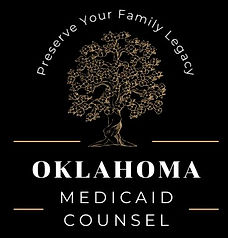Medicaid "Estate Recovery"
Medicaid estate recovery is a federal program that allows states—including Oklahoma—to recover the cost of long-term care benefits paid out by Medicaid after the recipient dies.
When someone receives Medicaid to pay for nursing home care, in-home care, or hospital services after age 55, Oklahoma must try to recover those costs from their estate after death. This is called Estate Recovery.
It’s how Medicaid “reimburses” itself for some of the taxpayer-funded benefits it provided.
🏠 What Assets Can Be Recovered?
The state can recover from the assets in your probate estate, such as:
-
Your home
-
Vehicles
-
Bank accounts
-
Other property in your name at the time of death
❗ Caution:
In Oklahoma, this usually means assets that go through the probate court process and real property owned by the Medicaid recipient. This includes the home that was exempt at the time of Medicaid application.
⛔ When Does Estate Recovery Happen?
Only after the Medicaid recipient dies, and only if:
-
They were 55 or older when they received Medicaid long-term care services
-
They owned assets at death that are subject to the estate recovery rules.
👪 Are There Exceptions?
Yes. The state cannot pursue estate recovery if:
-
The recipient has a surviving spouse
-
The recipient has a child under 21
-
The recipient has a blind or disabled child of any age
Additionally, recovery may be delayed if a sibling of the Medicaid recipient or a caretaker child was living in the home and meets specific requirements.
🛡️ Can Estate Recovery Be Avoided?
In many cases, yes—with proper planning. Strategies include:
-
Transferring your home into a Medicaid Asset Protection Trust
-
Ensuring assets pass outside of probate (e.g., through a living trust or beneficiary designations)
-
Using life estate deeds or other estate planning tools to transfer real property
📞 Bottom Line:
Medicaid can come back for repayment—but only under certain conditions. With smart legal planning, you can usually protect your home and savings from estate recovery.
Contact us today for a free consultation.
